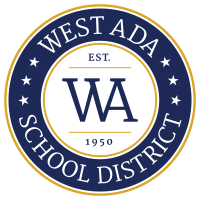The West Ada School Board approved a new policy that dictates how teachers can decorate their classrooms. The move is part of an effort to create “content neutrality” and adhere to a 2021 Idaho law regarding dignity and nondiscrimination in schools.

The board approved the new regulations in a unanimous vote Monday night. No one showed up for public comment.
The policy prevents teachers from using school property “for the advancement of individual beliefs.”
District spokesperson Greg Wilson stated at the Monday meeting that the intent of the policy is to ensure that the district is not putting “undue influence” on students, and to prevent bias and accusations of bias in schools.
The district also wants to ensure its policies align with Idaho’s Dignity and Nondiscrimination in Public Education Act, which passed in 2021 in light of accusations that critical race theory and social justice indoctrination were being taught in Idaho schools.
Though the policy’s language does not explicitly ban pride flags, district conversations have largely centered around concerns that teachers, by displaying LGBTQ+ symbols, are excluding some students in an effort to be inclusive of others.
Wilson told the Idaho Statesman the policy is “not about excluding one thing,” as reported by Becca Savransky.
West Ada Education Association president Zach Borman voiced concerns at a previous meeting about the policy’s impact on “at-risk” students, alluding to LGBTQ+ students in his comments, as well as the potential impacts of encroaching on teachers’ autonomy. The board later clarified that “at-risk” encompassed a range of concerns, including students who may not finish high school or who will deal with mental health issues.
The policy is limited to school property, and does not prevent teachers or students from wearing items like pride flag pins on their person. The policy is also separate from other district policies that dictate how to teach “controversial issues.”
The new policy lists the following as examples of approved classroom displays:
- The current Idaho state flag.
- Flags or banners used as part of a temporary unit of student instruction within the approved curriculum, as long as they represent factually accurate history. This also includes a temporary display of other countries’ national flags with approval from the principal or designee.
- Displays that are used as a routine part of the class-approved curriculum or in aid of learning, like the periodic table, mathematical equations, the U.S. or Idaho Constitution, and motivational posters.
- Displays that denote recognition of achievement by the district, school, or class, with approval from the building principal or designee.
- School or district sports tournament flags or banners that recognize the participation of a school team.
- Content promoting post-secondary educational opportunities.
- Student works and artwork displayed temporarily, as long as they are not in violation of other district policy.
- Information from student clubs, with approval by the building principal or designee, as long as they are not in violation of other district policy.
- Classroom activity photos, consistent with FERPA requirements.
- Personal family photographs of school employees.
- Promotional materials from athletic and activities sponsors, with approval by the superintendent or designee.
“Although this list is comprehensive,” said Wilson, “it also clarifies that there may be items that align with these standards and that are not included on this list. But items on this list must also be content neutral and remain in alignment with the intent of the policy.”
The list was workshopped by a district committee that included teachers, administrators and education organization representatives. At last month’s board meeting, committee members said the group was passionate, and talked through many different beliefs and opinions when creating the list. The committee also took feedback from two previous board meetings, and from district patrons.
“Through these conversations, I’ve really recognized that some of our students need additional support,” said board trustee Rene Ozuna. “And I hope that we’ve all heard that and can look at opportunities for these kids to have the clubs that they need or staff member support…and that we continue to build upon that for our students.”
The policy also clarifies language about the dissemination of teacher-student surveys, requiring teachers to get approval from their principals or designees before giving students surveys or questionnaires, and ensuring students have the choice to participate with at least 24 hours to complete them.
